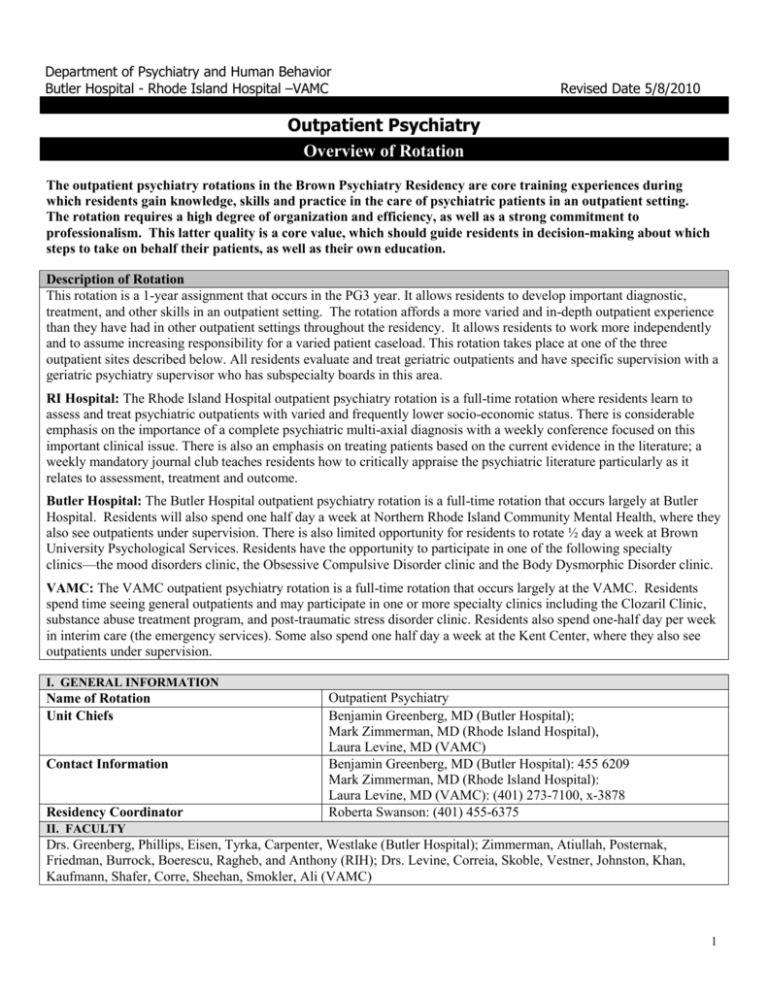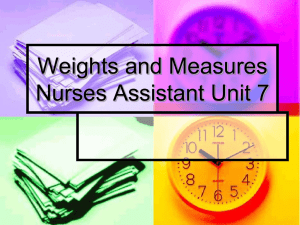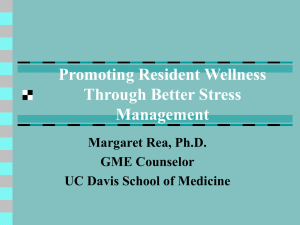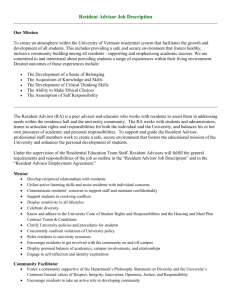Outpatient Psychiatry
advertisement

Department of Psychiatry and Human Behavior Butler Hospital - Rhode Island Hospital –VAMC Revised Date 5/8/2010 Outpatient Psychiatry Overview of Rotation The outpatient psychiatry rotations in the Brown Psychiatry Residency are core training experiences during which residents gain knowledge, skills and practice in the care of psychiatric patients in an outpatient setting. The rotation requires a high degree of organization and efficiency, as well as a strong commitment to professionalism. This latter quality is a core value, which should guide residents in decision-making about which steps to take on behalf their patients, as well as their own education. Description of Rotation This rotation is a 1-year assignment that occurs in the PG3 year. It allows residents to develop important diagnostic, treatment, and other skills in an outpatient setting. The rotation affords a more varied and in-depth outpatient experience than they have had in other outpatient settings throughout the residency. It allows residents to work more independently and to assume increasing responsibility for a varied patient caseload. This rotation takes place at one of the three outpatient sites described below. All residents evaluate and treat geriatric outpatients and have specific supervision with a geriatric psychiatry supervisor who has subspecialty boards in this area. RI Hospital: The Rhode Island Hospital outpatient psychiatry rotation is a full-time rotation where residents learn to assess and treat psychiatric outpatients with varied and frequently lower socio-economic status. There is considerable emphasis on the importance of a complete psychiatric multi-axial diagnosis with a weekly conference focused on this important clinical issue. There is also an emphasis on treating patients based on the current evidence in the literature; a weekly mandatory journal club teaches residents how to critically appraise the psychiatric literature particularly as it relates to assessment, treatment and outcome. Butler Hospital: The Butler Hospital outpatient psychiatry rotation is a full-time rotation that occurs largely at Butler Hospital. Residents will also spend one half day a week at Northern Rhode Island Community Mental Health, where they also see outpatients under supervision. There is also limited opportunity for residents to rotate ½ day a week at Brown University Psychological Services. Residents have the opportunity to participate in one of the following specialty clinics—the mood disorders clinic, the Obsessive Compulsive Disorder clinic and the Body Dysmorphic Disorder clinic. VAMC: The VAMC outpatient psychiatry rotation is a full-time rotation that occurs largely at the VAMC. Residents spend time seeing general outpatients and may participate in one or more specialty clinics including the Clozaril Clinic, substance abuse treatment program, and post-traumatic stress disorder clinic. Residents also spend one-half day per week in interim care (the emergency services). Some also spend one half day a week at the Kent Center, where they also see outpatients under supervision. I. GENERAL INFORMATION Name of Rotation Unit Chiefs Contact Information Residency Coordinator Outpatient Psychiatry Benjamin Greenberg, MD (Butler Hospital); Mark Zimmerman, MD (Rhode Island Hospital), Laura Levine, MD (VAMC) Benjamin Greenberg, MD (Butler Hospital): 455 6209 Mark Zimmerman, MD (Rhode Island Hospital): Laura Levine, MD (VAMC): (401) 273-7100, x-3878 Roberta Swanson: (401) 455-6375 II. FACULTY Drs. Greenberg, Phillips, Eisen, Tyrka, Carpenter, Westlake (Butler Hospital); Zimmerman, Atiullah, Posternak, Friedman, Burrock, Boerescu, Ragheb, and Anthony (RIH); Drs. Levine, Correia, Skoble, Vestner, Johnston, Khan, Kaufmann, Shafer, Corre, Sheehan, Smokler, Ali (VAMC) 1 III. TOPICS/TEACHING METHODS/MATERIALS USED DURING THIS ROTATION Topics to be covered are based upon: The patients assessed and treated by the residents over the course of the rotation Principal teaching methods: Attending supervision Weekly afternoon seminars Educational materials provided/referred to residents: Reading: Each attending and resident is expected to utilize current psychiatric literature regarding assessment and treatment of psychiatric patients in the emergency/acute setting. Computer-assisted educational materials: All housestaff have access to full-text literature search and retrieval capacity through the hospitals’ computer networks. Terminals are located in the emergency room of the hospitals. Other: Residents are given articles as part of their weekly afternoon seminar series . IV. SPECIFIC AREAS & EXPECTATIONS V. EVALUATIONS Evaluation of the resident's successful completion of the above goals will be carried out by the attending. Evaluation of the attending's successful completion of the above goals will be carried out by the resident. Evaluation of the rotation will be completed as part of the annual resident retreat report. VI. RESPONSIBILITIES OF ATTENDING ON ROTATION The chief of service will oversee the educational experience for the residents. Supervisors will oversee the care of the patients in the resident’s caseload assigned to that particular supervisor. VII. RESPONSIBILITY OF RESIDENT ON ROTATION Resident is expected to spend 20 hours a week seeing general outpatients plus 4 hours a week in a specialty clinic (BH and VAMC). Resident is responsible for evaluation, treatment, and disposition of psychiatric outpatients. Resident is responsible for collecting all relevant information on the patient, including reviewing old medical records. Resident is responsible for family and patient communication. Resident is responsible for discussing the case with his or her supervisor, other health care professionals involved with the patient and the patient’s family, as dictated by the circumstances. Resident is responsible for written or dictated evaluations of all patients assessed and followed. Resident will submit an online evaluation of the attending upon completion of the rotation. Resident must attend weekly educational experiences that are site- and rotation-specific. Resident is responsible for covering for their patients 24 hours a day (BH and RIH). Resident must inform their patients how they can be reached in the event of an emergency VIII. SCHEDULE DURING THIS ROTATION Grand Rounds 1st Wednesday of each month, 11:00, Ray Hall, Butler Hospital Campus Weekly Afternoon Seminars Wednesdays from 1:10 to 4:30 required for all PG3 residents RCC Clinic Butler Hospital: Clinical Case Conference Geriatric Psychiatry Seminar Forensic Psychiatry RIH: Clinical Case Conference Journal Club DSM Conference VAMC: Clinical Case Conference Tuesdays at 1:00 3rd Thursday of each month, 12:00, Ray Hall, Butler Hospital Campus weekly (3 weeks/month) biweekly monthly last Tuesday of month at 8 am Thursdays at 8 am Tuesdays at 8 am 4th Wednesday of each month 8am 2 Geriatric Psychiatry Seminar Departmental Colloquium Challenging Case Conference Neuropsychiatry seminar Departmental Journal club biweekly 3rd Wednesday of each month 11am 4th Wednesday of each month 11am biweekly monthly IX. GENERAL EDUCATIONAL OBJECTIVES Residents will: Assess outpatients and implement outpatient treatment for individuals with psychiatric and or psychological difficulties Develop important diagnostic and treatment skills in an outpatient setting Function independently in an outpatient setting with supervision Have both a theoretical and practical understanding of individual psychotherapies Have both a theoretical and practical understanding of group and family therapy Recommend laboratory/imaging tests Prepare and present case presentations Develop an appreciation for cost-efficient care, and proper utilization of resources Work in a coordinated fashion with other treatment providers Recognize when patients need a higher level of treatment (e.g., inpatient hospitalization or partial hospitalization) X. GOALS AND OBJECTIVES FOR THIS ROTATION – COMPETENCY-BASED Competency/Description 1. Patient Care Goals and Objectives Resident must be able Resident will Prepare and present case presentations to provide care that is Develop the ability to communicate effectively and demonstrate caring and compassionate, respectful behaviors when interacting with patients and their families. appropriate, and Learn to gather essential and accurate information about their patients Learn to make informed decisions about diagnostic and therapeutic effective for the interventions based on patient information and preferences, up-to-date treatment of health scientific evidence, and clinical judgment problems and the Learn to develop and carry out patient management plan promotion of health. Learn to counsel and educate patients and their families - 2. Medical Knowledge Residents must demonstrate knowledge about established and evolving biomedical, clinical, and cognate (e.g. epidemiological and socialbehavioral) sciences and the application of this knowledge to patient care. 3. Interpersonal and Communication Skills Residents must be able to demonstrate interpersonal and communication skills that result in effective information exchange and teaming with Provide health care services aimed at preventing health problems or maintaining health Work with health care professionals, including those from other disciplines, to provide patient-focused care Use information technology to support patient care decisions Goals and Objectives Residents will Demonstrate an investigatory and analytic thinking approach to clinical situations Know and apply the basic and clinically supportive sciences which are appropriate to their discipline Learn to generate a differential diagnosis and unique treatment plan for each patient encounter Learn to effectively communicate their investigatory and analytic thinking approach via written notes and presentations to supervisors and other health care professionals Will keep abreast of new scientific knowledge, which is obtained via didactic sessions, Grand Rounds, critical review of scientific literature, computer and web-based resources Will actively participate in seminars Goals and Objectives Residents will - - Evaluation Method - Residents are evaluated by their supervisors Create and sustain a therapeutic and ethically sound relationship with patients Scrupulously maintain patient confidentiality, and specifically reassure patients/families of the confidentiality of their personal and medical information Know and be able to describe the proper boundaries of the physician/patient Evaluation Method - Feedback of both oral and written presentations will be provided by supervisors Evaluation Method Residents are evaluated by their supervisors 3 patients, their patients’ families, and professional associates. 4. Professionalism Residents must demonstrate a commitment to carrying out professional responsibilities, adherence to ethical principles, and sensitivity to a diverse patient population relationship, and will consistently and conscientiously avoid any breach of these boundaries. - Residents will write clearly and legibly when hand-writing instructions or other information for patients/families - Written communications in patient charts will effectively permit subsequent caregivers to understand the nature of the patient interaction and the goals and plans for the encounter as well as future encounters when applicable Goals and Objectives Residents will Demonstrate their responsibility to patient care by: (1)Responding to communication from patients and health professionals in a timely manner, (2) Establishing and communicating back-up arrangements, including how to seek emergent and urgent care when necessary, (3) Using medical records for appropriate documentation of the course of illness and its treatment , (4) Providing coverage if unavailable, (for example, when out of town or on vacation), (5) Coordinating care with other members of the medical and/or multidisciplinary team, (6) Providing for continuity of care, including appropriate consultation, transfer, or referral if necessary Demonstrate ethical behavior, integrity, honesty, compassion, and confidentiality in the delivery of care, including matters of informed consent/assent, professional conduct, and conflict of interest. Demonstrate respect, sensitivity and responsiveness for and to patients and their families, and their colleagues as persons, including their ages, cultures, disabilities, ethnicities, genders, socioeconomic backgrounds, religious beliefs, political leanings, and sexual orientations. Demonstrate understanding of and sensitivity to end of life care and issues regarding provision of care. Review their professional conduct and remediate when appropriate. Residents will make reasonable efforts to act as advocates for their patients. Residents will truthfully report medical errors of their own to their attending, or Risk Management and to follow hospital protocols in the face of errors. Residents will encourage and facilitate reporting of medical error on the part of professional colleagues. Residents will seek professional help for personal impairments that may compromise patient care; will assist impaired colleagues to obtain professional help; and will take responsibility for interceding to protect patient safety when impaired colleagues do not respond appropriately to their own duties in this regard. - 5. Practice-Based Learning and Improvement Residents must be able to investigate and evaluate their patient care practices, appraise and assimilate scientific evidence, and improve their patient care practices. - - - - - - - Attendings will evaluate residents - Feedback from nursing staff, other disciplines Residents will clearly and openly identify and repudiate statements of prejudice made by professional colleagues, and will not permit their actions as physicians to be influenced by such prejudice.. Residents will create and sustain a therapeutic and ethically sound relationship with patientsResidents will participate in the review of the professional conduct of their colleagues. (teaching call) Goals and Objectives - Evaluation Method At the end of this rotation, the resident should be able to identify gaps in knowledge based upon experience, introspective awareness, and feedback for the year. The resident is expected to regularly review both textbook and primary source literature to maintain up to date understanding of specific topics that have arisen in practice. The resident should actively seek feedback and advice on practice from peers, mentors, staff, and patients alike to gain greater objective insight into their strengths and weaknesses. The resident should be able to obtain scientific literature, appraise quality, and assimilate data through the use of up to date resources to improve their practice and care of patients’ health problems. The resident will gain basic skills in literature search methodologies using standard web-based medical literature search engines such as Ovid, MD Consult, Pubmed. The resident will have familiarity with a variety of computer and hand-held computer based resources for looking up medications, dosing, and other topics of use to the general internist The resident will actively participate in lectures and discussions with peers and experts on the topics related to the care of their patients. Evaluation Method - Day to day knowledge base evaluated by feedback on diagnoses, and both psychooharmacologic and psychotherapeutic treatment approaches The resident is expected to take a proactive and interactive approach to enhancing their knowledge. The resident is expected to “think out loud”, ask for clarification and guidance, and actively 4 - 6. Systems-Based Practice Resident must demonstrate an awareness of and responsiveness to a larger context and system of health care and the ability to effectively call on system resources to provide care that is of optimal value. By the end of their training, residents are expected to have attained competence in the following goals. seek input on their practice and knowledge base from their mentors. The resident will facilitate the learning of students and other health care professionals Goals and Objectives - The resident will learn to practice cost-effective health care and resource allocation that does not compromise quality of care - The resident will learn how to partner with health care managers and health care providers to assess, coordinate, and improve health care and know how these activities can affect system performance - The resident will learn how to work other health care providers to develop and coordinate a care plan for their patients. - The resident will be familiar with the presence and influences of alternative and complimentary therapies, and its use in their populations and patients. - The resident will learn about a variety of insurances and how they affect patient referrals and prescriptions. They will learn the legal rights of the uninsured and will work with the appropriate services to assist patients who are under- or un-insured. - The resident will learn how to interact and advocate effectively with other physicians, ancillary caregivers, community agencies, landlords, and insurance companies etc. via spoken and written communications when it effects the health of their patients. - The resident will learn about the various community resources available for patients and will work with case managers and social workers to enable patients to access these resources Evaluation Method - Evaluations from supervisors XI. OTHER IMPORTANT INFORMATION FOR RESIDENT DURING THIS ROTATION Residents should be mindful of the unique opportunity with which they are presented during this rotation. In caring for sick, hospitalized patients in a supervised environment, you are being given the chance to study in a protected environment while caring for patients with the illnesses you are studying. We urge you not to waste this time but rather to embrace your responsibilities and to study and teach based upon the needs of your patients. 5







